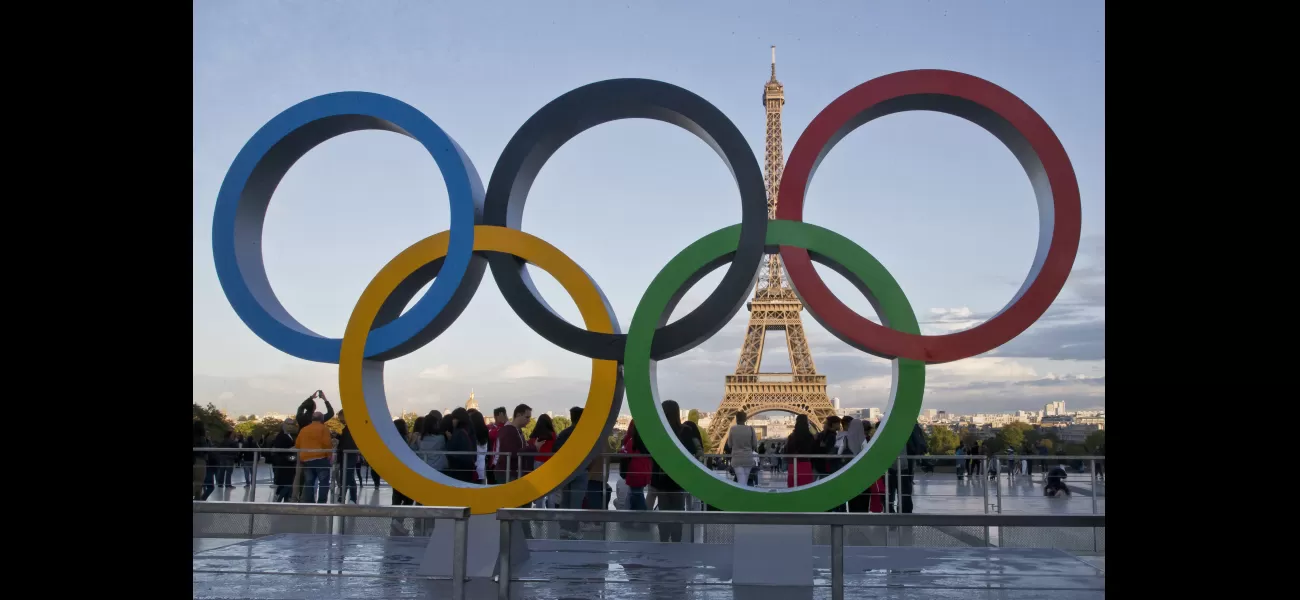Economists caution that hosting the Olympics is no longer economically feasible.
"Hosting the Olympics and Paralympics is now a difficult and costly achievement."
August 11th 2024.

The City of Lights, also known as Paris, is currently at the center of attention as it hosts a series of incredible performances that showcase the amazing capabilities of the human body, mind, and spirit. This is all thanks to the Olympic and Paralympic Games being held there. However, putting on such a grand event has become a difficult and costly task.
Hosting the Olympics has become quite a challenge in and of itself, and the financial aspect is one of the biggest hurdles. The summer and winter Games, which are held every four years, come with a hefty price tag. And unfortunately, in recent years, the spectacle has been marred by issues such as budget overruns, long-term debts, wasteful infrastructure, displacement and gentrification, political strife and environmental harm.
In an effort to improve the situation, the International Olympic Committee (IOC) is taking a different approach with the Paris Games. The non-governmental sports organization is aiming for a more frugal and environmentally-friendly approach. According to Victor Matheson, an economics professor at the College of the Holy Cross, the total cost of the Paris Games is estimated to be under $10 billion, making it the first Olympics since Sydney in which the costs have remained within this range.
The reason for this shift in approach is due to the fact that the IOC was running out of cities willing to host the Games. It has become clear to many cities that the old regime of hosting the Olympics has resulted in financial debacles and extremely expensive events with little hope of making a profit in the long run. However, some economists and researchers argue that a truly sustainable Olympics would require a major overhaul from the Games we know today.
The Olympics were also at a turning point 40 years ago. The 1968 Mexico City Games and 1972 Munich Games were marked by deadly violence, and the 1976 Montreal Games experienced significant cost overruns. As a result, there were very few cities willing to bid on the 1984 Games. Los Angeles ended up being the only city to bid, and they were able to use their existing infrastructure and stadiums, secure lucrative corporate sponsorships and broadcast rights, and turn the event into the massive marketing behemoth it is today. To top it off, the LA Organizing Committee ended up with a surplus of $215 million.
This success paved the way for other cities and countries to compete for the honor of hosting the Games. However, with the competition came exorbitant bidding costs, with some cities spending over $100 million just to bid. And once they won the bid, the costs often far exceeded the initial estimates and budget.
According to a study by Oxford University, five of the past six Olympics have had cost overruns of well over 100%. This means that the actual costs were more than double the initial budget. And this is a conservative estimate, as the study did not include indirect costs such as improvements to infrastructure. Additionally, the Olympics have become increasingly extravagant, with cities like Beijing spending over $40 billion for the 2008 Summer Games and Sochi spending over $50 billion for the 2014 Winter Games. This trend continued with Rio's costs reaching $20 billion for the 2016 Summer Olympics.
According to sports economist Andrew Zimbalist, it is important to consider all costs associated with the Olympics, not just the 17 days of the actual event. This includes indirect costs as well as direct operating costs that may not be accounted for in the official budget. These costs add up and show that the revenue generated from the Games, which has averaged $6-8 billion since 2005, is significantly less than the total cost.
Furthermore, Zimbalist notes that the accounting for the Olympics is easily manipulated, with some costs being left off the books. In a report released before the COVID-19 pandemic, Japan's National Audit Board found that the Tokyo Olympic organizers' estimated budget of $12.6 billion did not include $17 billion of direct costs. This shows that the true cost of hosting the Olympics is often much higher than what is officially reported.
The beautiful and bustling city of Paris has once again taken center stage, as it hosts a series of awe-inspiring performances and remarkable achievements of the human body, mind, and spirit. This is all thanks to the Olympic and Paralympic Games, which have become a true testament to human strength and determination. However, it should be noted that hosting such an event has become a daunting task in itself, especially when it comes to finances.
The summer and winter games, which take place every four years, come at a significant cost. In recent decades, this spectacle has been marred by issues such as budget overruns, long-term debts, wasteful infrastructure, displacement, gentrification, political conflicts, and environmental damage. It is clear that something needs to change in order for the Olympics to become a more sustainable and financially viable event. And the International Olympic Committee (IOC) is hoping to do just that, starting with the upcoming Paris Games.
According to Victor Matheson, a professor of economics at the College of the Holy Cross who has studied the financial costs of the Olympics, this will be the first time since the Sydney Games that the total costs will be under $10 billion. He added that this is because the IOC was running out of cities willing to host the event. It has become evident that, under the previous system, hosting the Olympics was a financial disaster for the cities involved, with little hope of making a profit in the long run.
However, some economists and researchers believe that a truly sustainable Olympics will need to look very different from what we know today. This is because, four decades ago, the Olympics were also at a crossroads. The deadly violence at the 1968 Mexico City Games and 1972 Munich Games, as well as the dramatic cost overruns at the 1976 Montreal Games, had made it challenging to find a host city for the 1984 event. Ultimately, Los Angeles was the only city willing to bid for the games. They were able to use existing infrastructure and stadiums, secure lucrative sponsorships and broadcast rights, and transform the event into the massive marketing opportunity it is today. Not only did they break even, but they also ended up with a surplus of $215 million.
This success story inspired other cities and countries to vie for the honor of hosting the Olympics. In the bidding process alone, some cities spent upwards of $100 million. And even when they did secure the bid, the costs often exceeded initial estimates and budgets. According to an Oxford University study, five of the past six Olympics have had inflation-adjusted cost overruns of well over 100%. The researchers noted that this was the case for no other type of mega-project, including nuclear power plants or the storage of nuclear waste.
Furthermore, these figures do not even include indirect costs such as improvements to roads, rail, airports, hotels, and other infrastructure not directly related to the operations of the games. According to Andrew Zimbalist, a sports economist at Smith College who wrote about the economic tensions of the Olympics and World Cup, the games themselves have become increasingly extravagant. For example, Beijing spent over $40 billion on the 2008 Summer Games, Sochi over $50 billion on the 2014 Winter Games, and Rio's costs approached $20 billion for the 2016 Summer Olympics.
Zimbalist also noted that the accounting for the Olympics is highly flexible and easy to manipulate. In addition to indirect costs not being included in the official budgets, some direct operating costs are also left off the books. This was evident when, in late 2019, Japan's National Audit Board found that the Tokyo Olympic organizers' estimated cost of $12.6 billion did not include $17 billion of direct costs.
In conclusion, it is clear that the Olympics need to become more financially sustainable in order to continue to showcase the incredible feats of human strength and determination. While the IOC hopes to achieve this with a more frugal and eco-friendly approach, some believe that a more significant transformation is needed. The extravagant nature of the games, combined with the difficulty in accurately accounting for all expenses, has led to significant financial challenges for host cities. It remains to be seen how Paris will fare as it takes on the daunting task of hosting the 2024 Games.
Hosting the Olympics has become quite a challenge in and of itself, and the financial aspect is one of the biggest hurdles. The summer and winter Games, which are held every four years, come with a hefty price tag. And unfortunately, in recent years, the spectacle has been marred by issues such as budget overruns, long-term debts, wasteful infrastructure, displacement and gentrification, political strife and environmental harm.
In an effort to improve the situation, the International Olympic Committee (IOC) is taking a different approach with the Paris Games. The non-governmental sports organization is aiming for a more frugal and environmentally-friendly approach. According to Victor Matheson, an economics professor at the College of the Holy Cross, the total cost of the Paris Games is estimated to be under $10 billion, making it the first Olympics since Sydney in which the costs have remained within this range.
The reason for this shift in approach is due to the fact that the IOC was running out of cities willing to host the Games. It has become clear to many cities that the old regime of hosting the Olympics has resulted in financial debacles and extremely expensive events with little hope of making a profit in the long run. However, some economists and researchers argue that a truly sustainable Olympics would require a major overhaul from the Games we know today.
The Olympics were also at a turning point 40 years ago. The 1968 Mexico City Games and 1972 Munich Games were marked by deadly violence, and the 1976 Montreal Games experienced significant cost overruns. As a result, there were very few cities willing to bid on the 1984 Games. Los Angeles ended up being the only city to bid, and they were able to use their existing infrastructure and stadiums, secure lucrative corporate sponsorships and broadcast rights, and turn the event into the massive marketing behemoth it is today. To top it off, the LA Organizing Committee ended up with a surplus of $215 million.
This success paved the way for other cities and countries to compete for the honor of hosting the Games. However, with the competition came exorbitant bidding costs, with some cities spending over $100 million just to bid. And once they won the bid, the costs often far exceeded the initial estimates and budget.
According to a study by Oxford University, five of the past six Olympics have had cost overruns of well over 100%. This means that the actual costs were more than double the initial budget. And this is a conservative estimate, as the study did not include indirect costs such as improvements to infrastructure. Additionally, the Olympics have become increasingly extravagant, with cities like Beijing spending over $40 billion for the 2008 Summer Games and Sochi spending over $50 billion for the 2014 Winter Games. This trend continued with Rio's costs reaching $20 billion for the 2016 Summer Olympics.
According to sports economist Andrew Zimbalist, it is important to consider all costs associated with the Olympics, not just the 17 days of the actual event. This includes indirect costs as well as direct operating costs that may not be accounted for in the official budget. These costs add up and show that the revenue generated from the Games, which has averaged $6-8 billion since 2005, is significantly less than the total cost.
Furthermore, Zimbalist notes that the accounting for the Olympics is easily manipulated, with some costs being left off the books. In a report released before the COVID-19 pandemic, Japan's National Audit Board found that the Tokyo Olympic organizers' estimated budget of $12.6 billion did not include $17 billion of direct costs. This shows that the true cost of hosting the Olympics is often much higher than what is officially reported.
The beautiful and bustling city of Paris has once again taken center stage, as it hosts a series of awe-inspiring performances and remarkable achievements of the human body, mind, and spirit. This is all thanks to the Olympic and Paralympic Games, which have become a true testament to human strength and determination. However, it should be noted that hosting such an event has become a daunting task in itself, especially when it comes to finances.
The summer and winter games, which take place every four years, come at a significant cost. In recent decades, this spectacle has been marred by issues such as budget overruns, long-term debts, wasteful infrastructure, displacement, gentrification, political conflicts, and environmental damage. It is clear that something needs to change in order for the Olympics to become a more sustainable and financially viable event. And the International Olympic Committee (IOC) is hoping to do just that, starting with the upcoming Paris Games.
According to Victor Matheson, a professor of economics at the College of the Holy Cross who has studied the financial costs of the Olympics, this will be the first time since the Sydney Games that the total costs will be under $10 billion. He added that this is because the IOC was running out of cities willing to host the event. It has become evident that, under the previous system, hosting the Olympics was a financial disaster for the cities involved, with little hope of making a profit in the long run.
However, some economists and researchers believe that a truly sustainable Olympics will need to look very different from what we know today. This is because, four decades ago, the Olympics were also at a crossroads. The deadly violence at the 1968 Mexico City Games and 1972 Munich Games, as well as the dramatic cost overruns at the 1976 Montreal Games, had made it challenging to find a host city for the 1984 event. Ultimately, Los Angeles was the only city willing to bid for the games. They were able to use existing infrastructure and stadiums, secure lucrative sponsorships and broadcast rights, and transform the event into the massive marketing opportunity it is today. Not only did they break even, but they also ended up with a surplus of $215 million.
This success story inspired other cities and countries to vie for the honor of hosting the Olympics. In the bidding process alone, some cities spent upwards of $100 million. And even when they did secure the bid, the costs often exceeded initial estimates and budgets. According to an Oxford University study, five of the past six Olympics have had inflation-adjusted cost overruns of well over 100%. The researchers noted that this was the case for no other type of mega-project, including nuclear power plants or the storage of nuclear waste.
Furthermore, these figures do not even include indirect costs such as improvements to roads, rail, airports, hotels, and other infrastructure not directly related to the operations of the games. According to Andrew Zimbalist, a sports economist at Smith College who wrote about the economic tensions of the Olympics and World Cup, the games themselves have become increasingly extravagant. For example, Beijing spent over $40 billion on the 2008 Summer Games, Sochi over $50 billion on the 2014 Winter Games, and Rio's costs approached $20 billion for the 2016 Summer Olympics.
Zimbalist also noted that the accounting for the Olympics is highly flexible and easy to manipulate. In addition to indirect costs not being included in the official budgets, some direct operating costs are also left off the books. This was evident when, in late 2019, Japan's National Audit Board found that the Tokyo Olympic organizers' estimated cost of $12.6 billion did not include $17 billion of direct costs.
In conclusion, it is clear that the Olympics need to become more financially sustainable in order to continue to showcase the incredible feats of human strength and determination. While the IOC hopes to achieve this with a more frugal and eco-friendly approach, some believe that a more significant transformation is needed. The extravagant nature of the games, combined with the difficulty in accurately accounting for all expenses, has led to significant financial challenges for host cities. It remains to be seen how Paris will fare as it takes on the daunting task of hosting the 2024 Games.
[This article has been trending online recently and has been generated with AI. Your feed is customized.]
[Generative AI is experimental.]
0
0
Submit Comment





